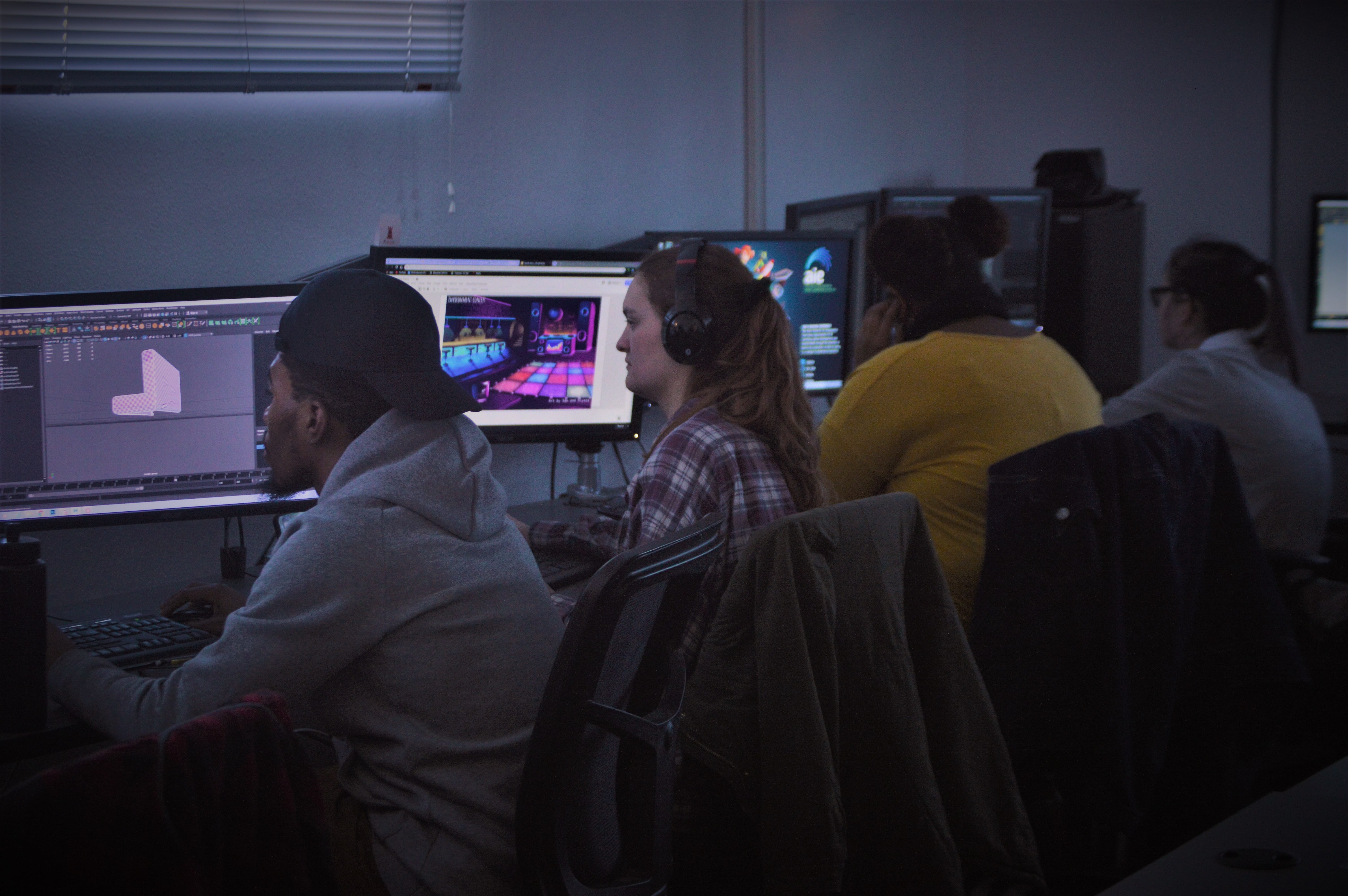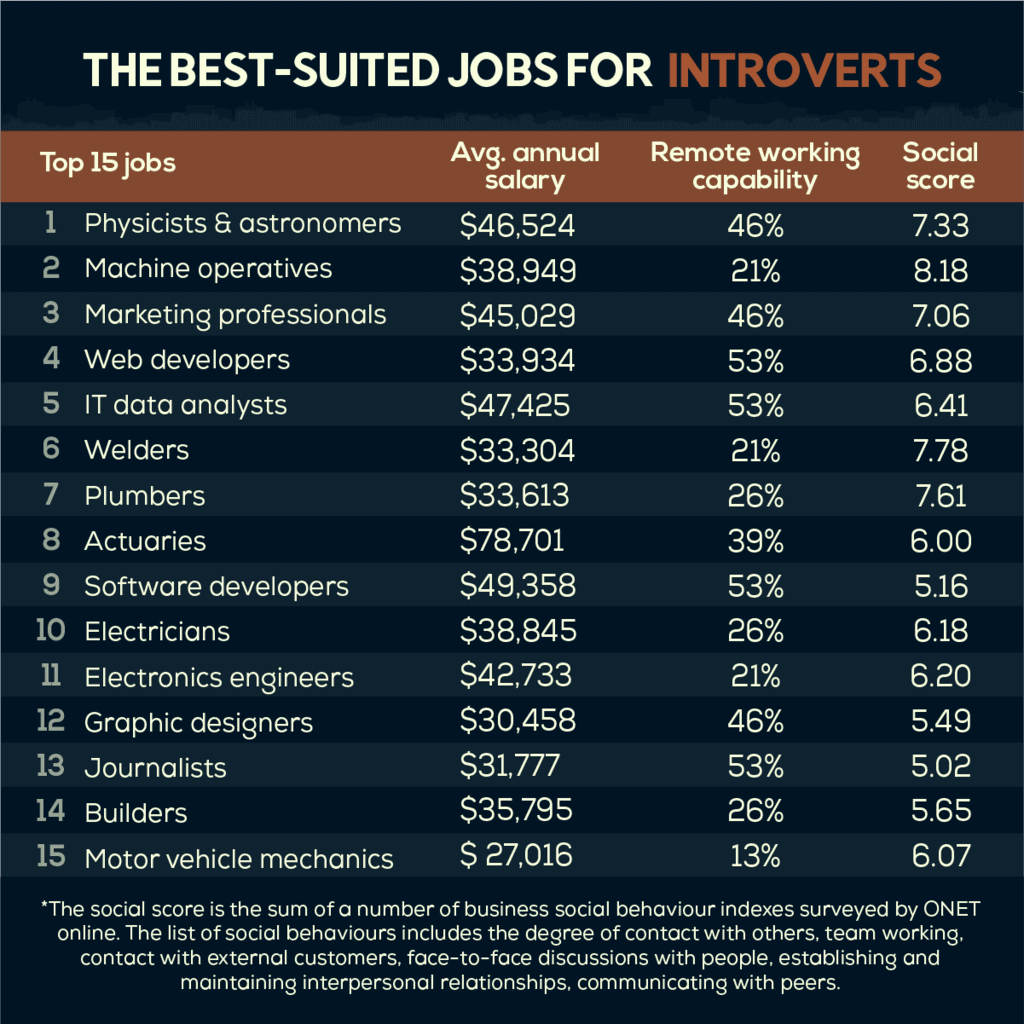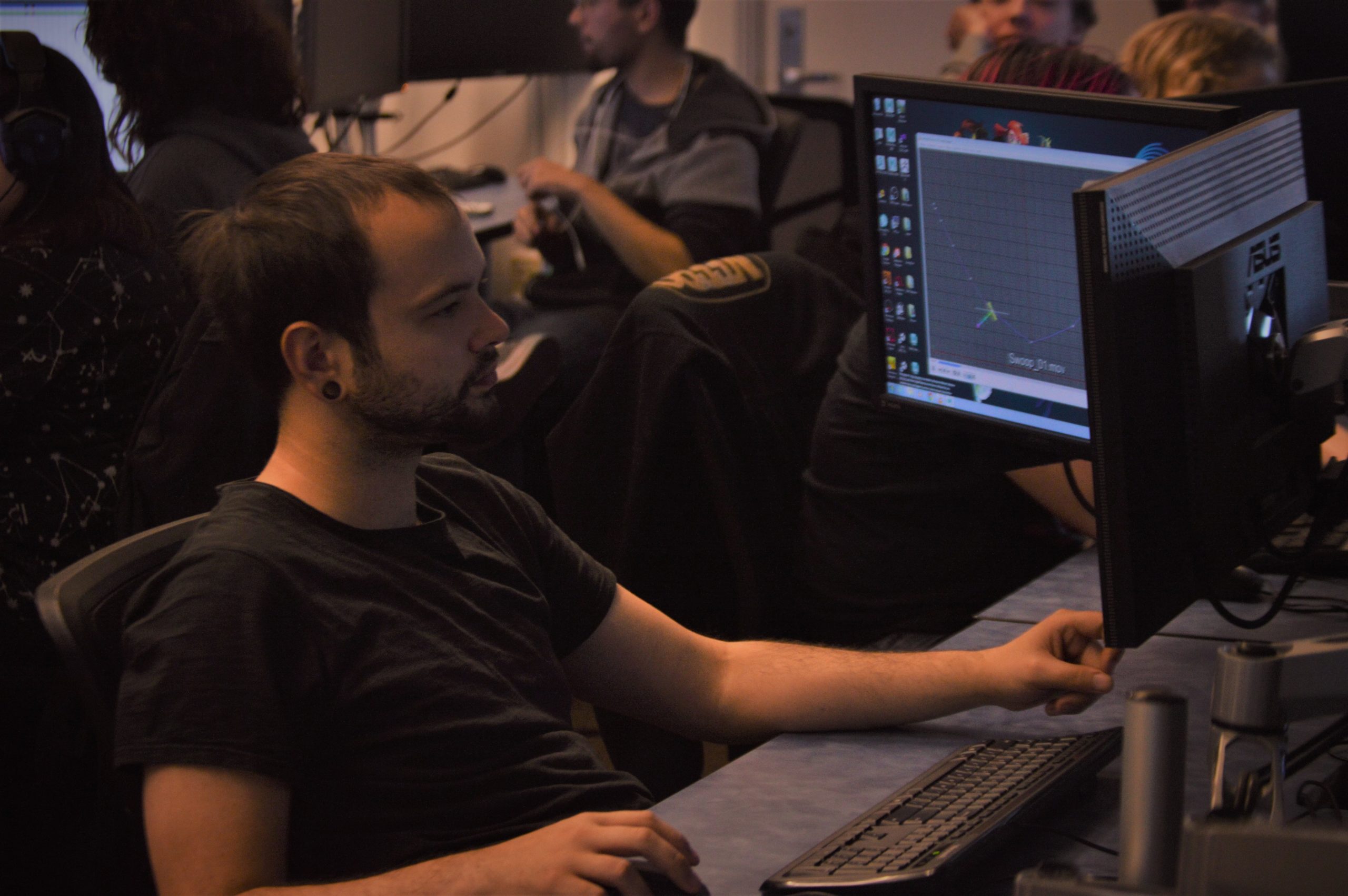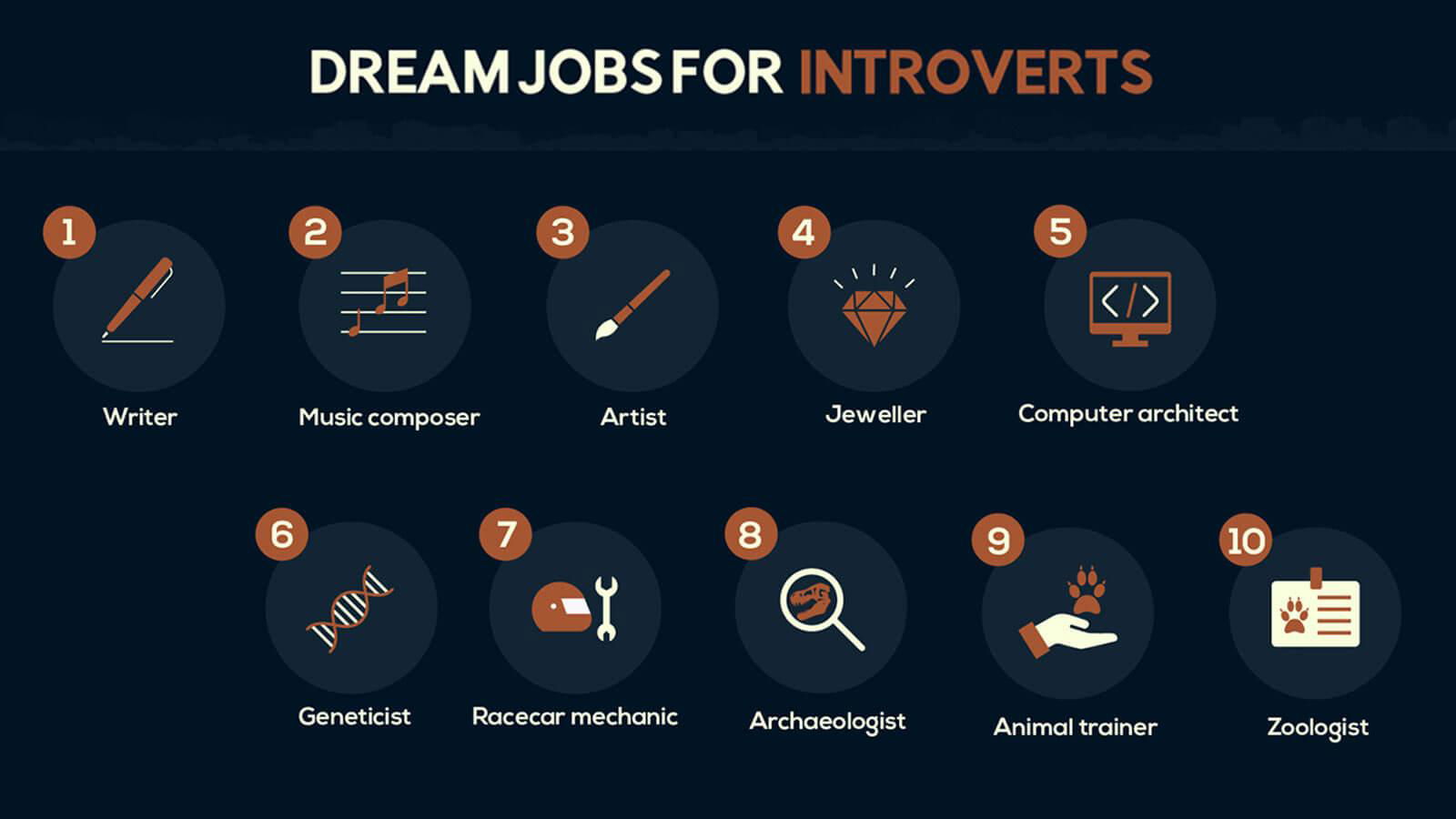In a world that often prioritizes extroversion, careers for creative introverts offer a unique perspective and valuable contributions to various industries. This guide delves into the strengths, challenges, and opportunities available to introverted creatives, empowering them to navigate their career paths with confidence and success.
From understanding the characteristics and traits of creative introverts to exploring suitable career options and building a personal brand, this comprehensive resource provides practical advice, inspiring examples, and actionable strategies. Whether you’re an introverted artist, writer, designer, or entrepreneur, this guide will equip you with the knowledge and tools to thrive in your creative endeavors.
Understanding Creative Introverts
Creative introverts are individuals who possess a unique blend of creativity and introversion. They are often highly imaginative, insightful, and possess a strong inner world. While they may not be as outwardly expressive as extroverts, they have a rich and complex inner life.Introverted creatives are often deep thinkers and have a strong need for solitude and reflection.
They are often drawn to careers that allow them to express their creativity in a quiet and focused environment, such as writing, painting, music, or design.
Strengths of Creative Introverts
- Strong imagination and creativity
- Deep thinking and insights
- Ability to focus and concentrate
- Patience and perseverance
- Self-motivation and independence
Challenges of Creative Introverts
- Difficulty in self-promotion and networking
- May be seen as shy or aloof
- May struggle with group work or public speaking
- Can be easily overwhelmed by large crowds or social situations
Leveraging the Abilities of Creative Introverts
Creative introverts can leverage their unique abilities in the workplace by:
- Seeking out roles that allow for independent work and creativity
- Collaborating with others who share their interests
- Using their insights to generate innovative ideas
- Sharing their work with others in a way that feels comfortable for them
Identifying Career Options

: Creative introverts possess unique strengths and qualities that make them well-suited for a variety of careers. They are often drawn to fields that allow them to express their creativity, work independently, and make a meaningful contribution to society.
This section will provide an overview of suitable career paths for creative introverts, categorized by industry and job function, along with the skills and qualities required for each.
: When choosing a career, creative introverts should consider their interests, skills, and personality traits. They should look for careers that allow them to use their creativity, work independently, and make a meaningful contribution to society. They should also consider the earning potential and job outlook for each career.
Creative Services
Creative services is a broad industry that encompasses a wide range of careers, including graphic designers, web designers, photographers, and writers. Creative introverts are well-suited for these careers because they allow them to express their creativity, work independently, and make a meaningful contribution to society.
- Graphic Designer:Graphic designers create visual concepts, using computer software or by hand, to communicate ideas that inspire, inform, and captivate consumers. They develop the overall layout and production design for various applications such as brochures, magazines, and corporate reports.
- Web Designer:Web designers are responsible for the visual appearance and functionality of websites. They work with clients to understand their needs and create websites that are both visually appealing and easy to use.
- Photographer:Photographers use cameras to capture images of people, places, and things. They may work in a variety of settings, including studios, outdoor locations, and events.
- Writer:Writers create written content for a variety of purposes, including articles, books, website content, and marketing materials. They may work in a variety of settings, including offices, homes, and coffee shops.
Skills and Qualities:Creative introverts who are interested in a career in creative services should have strong visual design skills, communication skills, and creativity. They should also be able to work independently and meet deadlines.
Companies and Organizations:Creative introverts can find work in a variety of companies and organizations, including advertising agencies, design firms, publishing houses, and non-profit organizations.
Earning Potential:The earning potential for creative introverts in creative services varies depending on their experience, skills, and industry. According to the U.S. Bureau of Labor Statistics, the median annual salary for graphic designers was $50,410 in May 2021. The median annual salary for web developers was $77,200 in May 2021.
The median annual salary for photographers was $40,220 in May 2021. The median annual salary for writers was $67,120 in May 2021.
Job Outlook:The job outlook for creative introverts in creative services is expected to be good over the next few years. The U.S. Bureau of Labor Statistics projects that employment of graphic designers will grow 3% from 2021 to 2031. The U.S.
Bureau of Labor Statistics projects that employment of web developers will grow 13% from 2021 to 2031. The U.S. Bureau of Labor Statistics projects that employment of photographers will decline 4% from 2021 to 2031. The U.S. Bureau of Labor Statistics projects that employment of writers will grow 9% from 2021 to 2031.
Networking and Job Opportunities:Creative introverts can network with other professionals in their field by attending industry events, joining online communities, and volunteering their time. They can also find job opportunities by searching online job boards, contacting recruiters, and networking with people in their personal and professional networks.
Introverted-Friendly Work Environments

Creative introverts thrive in work environments that cater to their unique strengths and preferences. By creating introverted-friendly work environments, organizations can unlock the full potential of their introverted employees.
Introverts need environments that provide flexibility, autonomy, and quiet spaces to recharge and focus. Research shows that introverts are more productive and creative when they have control over their work and can work independently.
Benefits of Introverted-Friendly Work Environments
- Increased productivity and creativity
- Reduced stress and burnout
- Improved employee morale and retention
Key Features of Introverted-Friendly Work Environments
- Flexibility:Allows introverts to work at their own pace and schedule, reducing stress and burnout.
- Autonomy:Gives introverts control over their work and decision-making, fostering creativity and productivity.
- Quiet spaces:Provides introverts with a place to recharge and focus, reducing distractions and improving concentration.
Examples of Introverted-Friendly Companies
- Google: Offers flexible work arrangements, quiet spaces, and opportunities for independent work.
- Microsoft: Provides introverted employees with mentorship programs and quiet work areas.
- IBM: Has a “Quiet Room” initiative that provides introverts with a dedicated space for focused work.
Research Support
A study by the University of California, Berkeley found that introverts who worked in introverted-friendly environments were more productive and creative than those who worked in traditional office settings.
Another study by the University of Michigan found that introverts who had autonomy over their work were more likely to report job satisfaction and reduced stress.
Networking and Collaboration

Creative introverts often face unique challenges when it comes to networking and collaboration. However, with the right strategies, they can build strong relationships and work effectively with others.Overcoming Social Anxiety:* Set realistic goals:Start with small, achievable goals to build confidence.
Prepare in advance
Research events and identify potential connections.
Practice active listening
Show interest in others by listening attentively and asking thoughtful questions.
Focus on quality over quantity
Aim to make a few meaningful connections rather than superficial acquaintances.
Leverage online platforms
Use social media and online networking groups to connect with like-minded individuals.Benefits of Online Networking:* Increased reach:Access a wider pool of potential collaborators and clients.
Flexibility
Engage with others on your own terms and at your own pace.
Anonymity
Allows introverts to interact without feeling overwhelmed.
Virtual collaboration tools
Careers for creative introverts abound, allowing them to express their individuality while working independently. For those with a passion for fashion, mia creative tailor offers an inspiring example of how introverts can thrive in the creative field. By embracing their unique strengths, creative introverts can find fulfilling careers that align with their personality and passions.
Utilize tools like video conferencing, instant messaging, and project management software to facilitate collaboration remotely.Navigating Social Events:* Arrive early:Get a feel for the environment and identify potential connections before the crowd arrives.
Seek out small groups
Engage in conversations with smaller groups rather than trying to join large ones.
Listen and observe
Pay attention to the conversations and observe others to identify common interests.
Offer help
Volunteer to assist with tasks or introductions, which can break the ice.
Follow up
After the event, connect with people you met via email or social media.Case Study:* Introverted artist collaborates with extroverted marketer:An introverted artist partnered with an extroverted marketer to promote their artwork. The artist’s creativity and unique vision complemented the marketer’s ability to connect with a wide audience.
Together, they created a successful exhibition and gained recognition for their work.
– Provide specific examples of freelance platforms and tools that cater to creative introverts.

Freelance platforms and tools provide creative introverts with a flexible and supportive environment to showcase their skills and connect with potential clients. Here are some notable platforms and tools:
- Upwork:A large and diverse platform with a wide range of freelance opportunities in various creative fields.
- Fiverr:A platform known for its affordable micro-gigs, allowing introverts to offer specific services or products.
- Toptal:An exclusive platform that connects top-tier creative talent with high-paying clients.
- Behance:A portfolio platform that allows creatives to showcase their work and connect with potential collaborators.
- Trello:A project management tool that helps introverts organize their tasks and collaborate effectively.
- Slack:A communication tool that enables introverts to engage in team discussions and share updates without the need for face-to-face interactions.
Leveraging Creativity
Introverted creatives possess unique talents that can drive their careers forward. By tapping into their strengths, they can excel in various roles and industries.
Self-expression is crucial for introverted creatives. Finding outlets to showcase their ideas and perspectives enhances their creativity and allows them to connect with others on a deeper level.
Innovation
Introverts often have a knack for thinking outside the box and generating novel ideas. They can challenge conventional wisdom and bring fresh perspectives to problem-solving, fostering innovation in their fields.
Developing Skills and Knowledge
Continuous learning is crucial for creative introverts to stay competitive and relevant in the evolving job market. Embracing ongoing education and skill development enables them to expand their knowledge base, enhance their creative abilities, and adapt to new technologies and industry trends.
To facilitate this learning journey, introverts can leverage a wealth of resources and strategies:
Online Courses and Platforms
- Coursera, edX, and Udemy offer a vast selection of online courses in various creative fields, allowing introverts to learn at their own pace and convenience.
- CreativeLive provides live and on-demand workshops taught by industry experts, enabling introverts to interact with professionals and gain practical knowledge.
Books and Publications
- Industry-specific books and magazines keep introverts abreast of the latest trends and best practices.
- Biographies and autobiographies of successful creative individuals offer valuable insights into their thought processes and career paths.
Workshops and Seminars
- Attending workshops and seminars provides introverts with opportunities to engage with like-minded individuals, learn from experienced professionals, and develop their skills in a hands-on environment.
- Conferences and industry events allow introverts to network with potential collaborators and stay informed about emerging technologies and trends.
Mentorship and Coaching
- Seeking guidance from experienced mentors can accelerate introverts’ professional growth and provide valuable insights into industry dynamics.
- Working with a career coach can help introverts identify their strengths, develop strategies for overcoming challenges, and navigate career transitions.
Building a Personal Brand: Careers For Creative Introverts
Intro: In today’s competitive job market, it’s more important than ever for creative introverts to build a strong personal brand. A personal brand is the unique combination of skills, experiences, and values that sets you apart from other job seekers.
It’s what makes you memorable and helps you stand out from the crowd.
: There are many benefits to building a strong personal brand. It can help you:
- Attract potential employers
- Get noticed by recruiters
- Land your dream job
- Increase your earning potential
- Build a successful freelance career
Creating a Portfolio
One of the most important aspects of building a personal brand is creating a strong portfolio. Your portfolio is a collection of your best work that showcases your skills and abilities. It’s what potential employers will use to evaluate your qualifications, so it’s important to make sure it’s well-organized and up-to-date.
- Choose your best work
- Organize your portfolio logically
- Use high-quality images
- Write clear and concise descriptions
- Get feedback from others
Promoting Yourself
Once you have a strong portfolio, it’s time to start promoting yourself. There are many ways to do this, including:
- Networking at industry events
- Creating a website or blog
- Using social media
- Writing guest articles
- Giving presentations
Networking
Networking is an essential part of building a personal brand. It’s a great way to meet new people, learn about new opportunities, and get your name out there. There are many different ways to network, including:
- Attending industry events
- Joining professional organizations
- Volunteering
- Taking classes
- Using social media
Managing Stress and Anxiety

Creative introverts may experience unique stressors and anxiety triggers, such as social interactions, performance pressure, and perfectionism. These challenges can hinder their productivity and well-being.
Coping Mechanisms
To manage stress and anxiety, creative introverts can adopt various coping mechanisms:
- Establish Boundaries:Set clear limits on social interactions and protect personal space.
- Practice Self-Care:Engage in activities that promote relaxation, such as meditation, exercise, or spending time in nature.
- Identify Triggers:Recognize situations or thoughts that trigger stress and develop strategies to mitigate them.
- Seek Support:Connect with trusted individuals, such as friends, family, or a therapist, for support and encouragement.
- Challenge Negative Thoughts:Replace self-critical or perfectionistic thoughts with positive affirmations and realistic expectations.
Strategies
In addition to coping mechanisms, creative introverts can employ strategies to reduce stress and anxiety:
- Create a Structured Routine:Establish a regular schedule that balances work, personal time, and breaks.
- Break Down Tasks:Divide large projects into smaller, manageable chunks to reduce overwhelm.
- Utilize Technology:Leverage technology to automate tasks, streamline communication, and minimize distractions.
- Foster a Positive Workspace:Design a work environment that is comfortable, inspiring, and free from distractions.
- Take Breaks:Schedule regular breaks throughout the day to rest and recharge.
By implementing these coping mechanisms and strategies, creative introverts can effectively manage stress and anxiety, creating a more conducive environment for their creativity and well-being.
Finding Mentorship and Support

As an introverted creative, finding mentorship and support is crucial for your professional growth and well-being. Mentors and peers can provide guidance, advice, and encouragement, helping you navigate the challenges of being an introvert in the creative industry.
To identify potential mentors, look within your professional network, attend industry events, and reach out to individuals whose work you admire. Consider reaching out to professors, former colleagues, or industry leaders who align with your career goals.
Building Connections
- Attend workshops and conferences to connect with other creative introverts and potential mentors.
- Join online communities and forums dedicated to introverted creatives.
- Volunteer your time to organizations that support creative introverts.
Creating a Work-Life Balance
For creative introverts, achieving a healthy work-life balance is crucial for maintaining well-being and sustaining creativity. It involves setting clear boundaries between work and personal life, prioritizing self-care, and managing stress effectively.
To establish a work-life balance, creative introverts should consider the following strategies:
Setting Boundaries
- Establish specific work hours and stick to them as much as possible.
- Designate a dedicated workspace that is separate from personal spaces.
- Communicate boundaries to family, friends, and colleagues, explaining when you are available for work-related matters.
Prioritizing Self-Care
- Schedule regular breaks throughout the workday for rest and relaxation.
- Engage in activities that promote well-being, such as exercise, meditation, or spending time in nature.
- Take vacations and disconnect from work completely to recharge and refresh.
Managing Stress, Careers for creative introverts
- Identify stress triggers and develop coping mechanisms to manage them effectively.
- Practice relaxation techniques such as deep breathing exercises or meditation.
- Seek support from a therapist or counselor if needed to address stress and anxiety.
Common Challenges and Solutions
| Challenge | Solution |
|---|---|
| Feeling overwhelmed by work | Break down tasks into smaller, manageable chunks. Delegate or outsource when possible. |
| Difficulty disconnecting from work | Set clear boundaries and stick to them. Create a dedicated workspace. |
| Social isolation | Schedule regular social activities and connect with other introverts through online communities or meetups. |
| Burnout | Recognize the signs of burnout and take steps to prevent it. Prioritize self-care and take breaks when needed. |
Quotes from Experts
“For creative introverts, work-life balance is not a luxury but a necessity.”– Susan Cain, author of Quiet: The Power of Introverts in a World That Can’t Stop Talking
“Introverts need time to recharge and reflect. Creating a work-life balance allows them to do this and maintain their creativity.”– Dr. Laurie Helgoe, author of Introvert Power: Why Your Inner Life Is Your Hidden Strength
Role-Playing Exercise: Setting Boundaries
Participant A:You are a creative introvert who is struggling to set boundaries with your work.
Participant B:You are a colleague who is frequently interrupting your work.
Scenario:Participant B approaches Participant A while they are working on a project.
Participant B:Hey, I just had a quick question about the report.
Participant A:I’m sorry, but I’m in the middle of something right now. Can I help you later?
Participant B:Oh, come on, it will only take a minute.
Participant A:I appreciate that, but I really need to focus on this project. I can help you after I finish.
Identify common traits and characteristics among successful creative introverts
Introverts often possess unique traits and characteristics that contribute to their success in creative fields. They tend to be highly observant, analytical, and introspective, allowing them to delve deeply into their inner worlds and explore complex emotions and ideas. Introverts also value solitude and quiet, which provides them with the necessary space to focus, reflect, and generate original ideas.
Introspective and Analytical Nature
Creative introverts often exhibit a strong introspective and analytical nature. They are highly self-aware and spend considerable time reflecting on their thoughts, feelings, and experiences. This inward focus allows them to gain a deep understanding of themselves and the world around them, which they can then express through their creative work.
Emerging Trends and Future Prospects
The world of work is rapidly changing, and this is creating new opportunities for creative introverts. Technology is making it easier than ever to work remotely, and this is giving introverts the chance to find work that suits their personality and lifestyle.
In addition, the rise of the gig economy is creating new opportunities for introverts to find work that is flexible and allows them to control their own hours. This is a great option for introverts who want to avoid the traditional office environment.
Impact of Technology
Technology is having a major impact on the career prospects of creative introverts. Remote work is becoming increasingly common, and this is giving introverts the opportunity to work from the comfort of their own homes. This can be a major advantage for introverts, as it allows them to avoid the social interactions that can be draining in a traditional office environment.
In addition, technology is also making it easier for introverts to connect with other creative people. Social media and online communities provide introverts with a way to network and collaborate with other like-minded individuals. This can be a great way for introverts to find work and build their careers.
Impact of Remote Work
Remote work is another major trend that is benefiting creative introverts. Remote work allows introverts to work from anywhere they have an internet connection. This can be a great option for introverts who want to avoid the commute and the social interactions that can be associated with working in an office.
In addition, remote work can also give introverts more control over their work-life balance. Introverts can set their own hours and work when they are most productive. This can be a great way for introverts to avoid burnout and maintain their mental health.
Resources and Support for Creative Introverts

Navigating the creative industry as an introvert can present unique challenges. Fortunately, there are numerous resources and support systems available to help creative introverts thrive.
Online Communities
Joining online communities specifically designed for creative introverts provides a valuable platform for networking, sharing experiences, and accessing resources. These communities offer a safe and supportive environment where introverts can connect with like-minded individuals and seek guidance from mentors and peers.
Organizations
Organizations such as the Introvert, Dear Association and the Quiet Revolution provide resources, workshops, and events tailored to the needs of introverted creatives. These organizations advocate for the unique strengths and perspectives of introverts and offer guidance on navigating the challenges of working in a world often designed for extroverts.
Benefits of Joining Communities and Accessing Resources
Engaging with these communities and resources offers numerous benefits for creative introverts, including:
- Building a network of supportive individuals
- Accessing mentorship and guidance from experienced introverts
- Gaining insights into managing the challenges of introversion
- Discovering opportunities for collaboration and professional development
- Promoting a sense of belonging and community
Additional Insights and Perspectives

To delve deeper into the experiences and challenges of creative introverts, we explore unique insights and perspectives, examining societal and cultural influences, the impact of introversion on creativity, and the significance of mentorship and support networks.
Introversion shapes the creative process in multifaceted ways. While introverts may prefer solitary environments for contemplation and idea generation, they also possess exceptional listening skills and empathy, enabling them to connect deeply with others and derive inspiration from diverse perspectives.
Societal and Cultural Factors
Societal expectations and cultural norms can present challenges for creative introverts. Extroverted traits are often idealized, leading to a perceived bias towards those who are outgoing and assertive. Introverts may feel pressure to conform, potentially suppressing their natural tendencies and hindering their creative expression.
Impact on Creative Expression
Introversion can profoundly influence creative expression. Introverts often prefer to work independently, allowing them to delve deeply into their inner worlds and explore complex emotions and ideas. They may find inspiration in solitude, drawing from their own experiences and observations to create authentic and introspective works.
Role of Mentorship and Support
Mentorship and support networks play a crucial role in fostering the success of creative introverts. Mentors can provide guidance, encouragement, and insights that help introverts navigate the challenges they face. Support networks offer a sense of community and belonging, allowing introverts to connect with like-minded individuals and share experiences.
Successful Creative Introverts
History is replete with examples of successful creative introverts who have overcome societal barriers and made significant contributions to their fields. Albert Einstein, a renowned physicist, was known for his introspective nature and solitary work habits. J.K. Rowling, the author of the Harry Potter series, found solace in writing during times of isolation.
Essential FAQs
What are the common challenges faced by creative introverts in the workplace?
Introverted creatives may struggle with feeling overwhelmed in highly social or noisy environments, difficulty networking and self-promoting, and feeling undervalued or misunderstood.
How can introverts leverage their unique strengths in their careers?
Introverts can capitalize on their strengths by seeking roles that allow for independent work, embracing their creativity and attention to detail, and utilizing their ability to focus deeply and produce high-quality work.
What are some suitable career options for creative introverts?
Introverted creatives may find success in fields such as writing, graphic design, web development, photography, music, and research, where they can work independently and express their creativity.